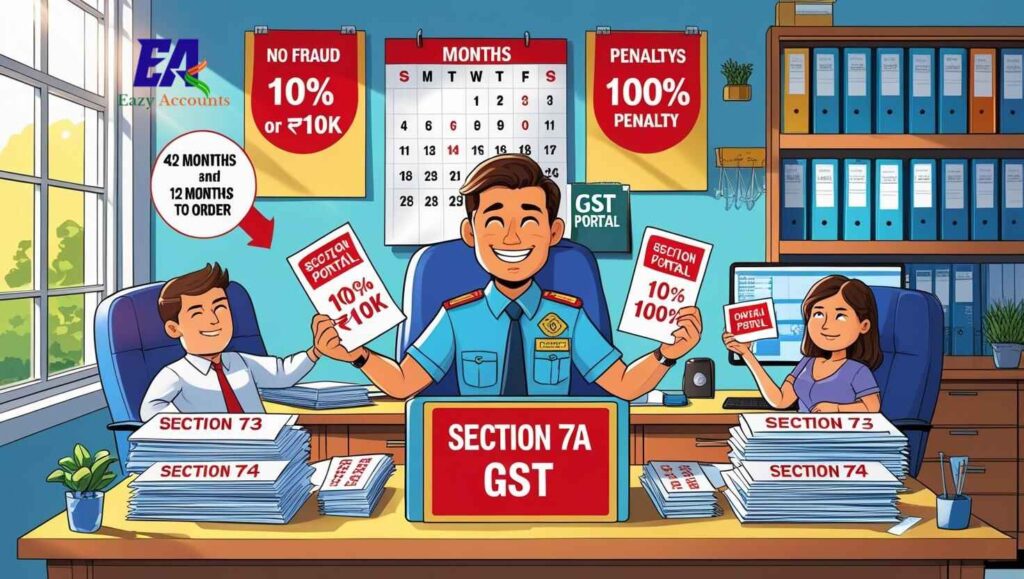Introduction – A New Chapter in GST Demand & Recovery
For years, GST had a split personality when it came to demand and recovery:
- Section 73 for the innocent slip-ups,
- Section 74 for the not-so-innocent, fraud and suppression cases.
From FY 2024–25 onwards, that split is gone. The Finance Act, 2024 has merged both into one Essential provision – Section 74A of GST Act – covering every case of tax not paid, short paid, wrongly refunded, or ITC wrongly availed.
Sounds simpler Right?. Means less penalty risk? Not exactly.
This new section is an Essential read for anyone who files GST returns, issues tax invoices, or claims ITC – because knowing its timelines, penalties, and relief options could be the difference between a quick closure and a costly fight.

Section 74A of GST Act – In Simple Words
From FY 2024–25, this is the only section you’ll see for GST demand and recovery, whether the issue is a simple oversight or a full-blown fraud case. Here’s what it says without the legal headache:
- Covers everything – Tax not paid, short paid, wrong refund, or ITC wrongly taken/used. Fraud or no fraud — it’s all in here.
- Small change? No case. – If the total tax difference in a financial year is under ₹1,000, no notice will be issued.
- The 42-month rule – The GST department has 42 months from the due date of the annual return (or from the date of a wrong refund) to send you a notice.
- The 12-month finish line – Once a notice is issued, the order must be passed within 12 months (extendable by maximum 6 months in special cases).
- Two penalty flavours –
- No fraud: 10% of tax or ₹10,000 (whichever is higher).
- Fraud: 100% of tax (ouch).
- Early action = lower cost – The earlier you pay, the smaller your penalty — more on that in the next section.
So, basically Section 74A of GST Act is the Essential rulebook for how GST disputes will now run — one section, one timeline, two penalty tracks. You can see the Official Act from here.
From Sections 73 & 74 to 74A – What Really Changed
Until FY 2023–24, GST demand and recovery worked like a two-lane road:
- Section 73 → for the “Oops, my bad” cases (no fraud).
- Section 74 → for the “You knew what you were doing” cases (fraud/suppression).
From FY 2024–25, the road has merged. Section 74A of GST Act is now the single lane for all demand cases – but with two different toll rates depending on whether fraud is involved.
Here’s the before-and-after snapshot:
| Feature | Section 73 (till FY 23–24) | Section 74 (till FY 23–24) | Section 74A (from FY 24–25) |
|---|---|---|---|
| Type of Case | Non-fraud | Fraud / suppression / wilful misstatement | Both in one section |
| Time limit for SCN | 3 years from due date of annual return | 5 years from due date of annual return | 42 months for all cases |
| Time limit for Order | Within 3 years (same as SCN limit) | Within 5 years (same as SCN limit) | 12 months from SCN (extendable by 6 months) |
| Minimum threshold | None | None | ₹1,000 tax difference per FY |
| Penalty (full) | 10% of tax or ₹10,000 | 100% of tax | Non-fraud: 10% of tax or ₹10,000 Fraud: 100% of tax |
| Early Payment Benefit | No fraud: zero penalty if paid before SCN / within 30 days of order | Fraud: reduced penalty if paid early (15%, 25%, 50%) | Same benefit structure inside one section: (8) = non-fraud, (9) = fraud |
| How to Identify in SCN | Clearly said “73” | Clearly said “74” | Always says “74A” — you must read the wording to know fraud vs. non-fraud |
Early Payment Benefits – Your Essential Shortcut to Lower Penalties
Section 74A doesn’t just tell you what you owe — it gives you a way to cut your penalty bill if you act fast. Think of it as a “pay early, save big” offer from the tax department (but without the balloons and confetti).
| Case Type | Before SCN | Within 60 days of SCN | Within 60 days of Order | After 60 days of Order |
|---|---|---|---|---|
| No Fraud | Pay Tax + Interest → No Penalty | Pay Tax + Interest → No Penalty | Full penalty applies (Maximum of 10% of tax or ₹10k) | Full penalty applies |
| Fraud | Pay Tax + Interest + 15% Penalty | Pay Tax + Interest + 25% Penalty | Pay Tax + Interest + 50% Penalty | Pay Tax + Interest + 100% Penalty |
How to read this table:
- SCN = Show Cause Notice
- The earlier you pay, the less you spend — especially in fraud cases where the penalty can be brutal.
- Miss the final 60-day window after the order, and you lose all discounts.
The Essential takeaway: Don’t sit on a GST notice. Decide quickly whether to contest or settle — because time is literally money here.
Practical Impact – What It Means for You
The shift to Section 74A of GST Act, is more than a tidy rewrite of Section 73 and 74 of GST Act – it changes how quickly you need to respond and how much you might end up paying.
For taxpayers:
- One clock for all cases – Whether it’s a typo or a tax scam, the GST officer now has the same 42-month deadline to issue a notice.
- Speed matters – Early payment can mean zero penalty (no fraud) or a big discount (fraud). Delay, and penalties can double your tax bill.
- Small relief for small amounts – Below ₹1,000 difference in a year? You’re in the clear.
For consultants & practitioners:
- Read the allegations in the SCN carefully — if it explicitly mentions fraud, wilful misstatement, or suppression of facts to evade tax, you’re in the fraud penalty track (sub-sec. 5(ii) & 9).
- Look for the penalty clause cited — if they cite “penalty equivalent to the tax” (100%), that’s fraud; if they cite “penalty of 10% or ₹10,000”, that’s non-fraud.
- Check the payment benefit table in the SCN — fraud cases will have the 15%, 25%, 50% early-payment penalty slabs; non-fraud cases will have the “no penalty if paid before/within 60 days” benefit.
- Faster closure – Fraud cases no longer stretch for 5 years before a notice; expect quicker investigations and orders.
- Client communication is key – The early-payment windows are strict — missing them can be an expensive mistake.
Final Word – Don’t Let Section 74A Catch You Off Guard
Section 74A of GST Act is supposed to make demand and recovery simpler. And in some ways, it does — one section, one timeline, clear penalty slabs.
But make no mistake: the penalties are still steep, and the windows to reduce them are tight. The earlier you act, the more you save. Delay, and the “discount” disappears.
Whether it’s a genuine oversight or a case flagged as fraud, the Essential thing is to know your options, calculate the impact, and decide fast.
If you’ve received (or expect) a GST notice under Section 74A, we can help you:
- Assess the actual liability,
- Plan the smartest payment or defence strategy,
- Minimise penalties using the early-payment provisions.
Act now – because in GST, time really is money.
Related Reads:
